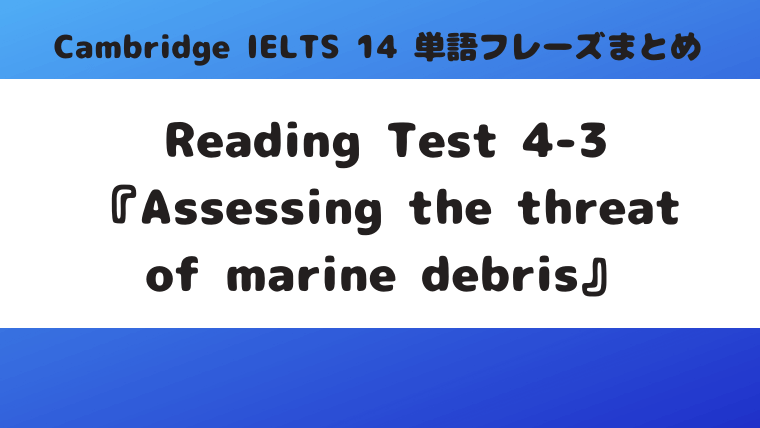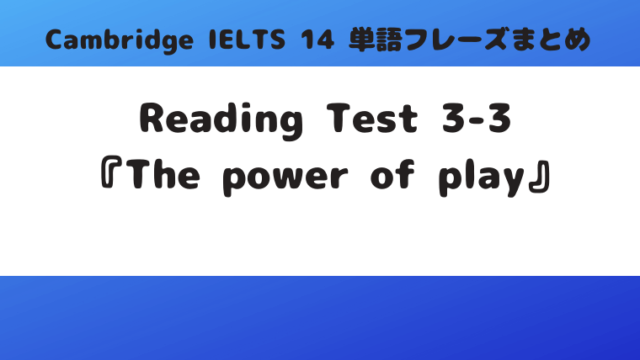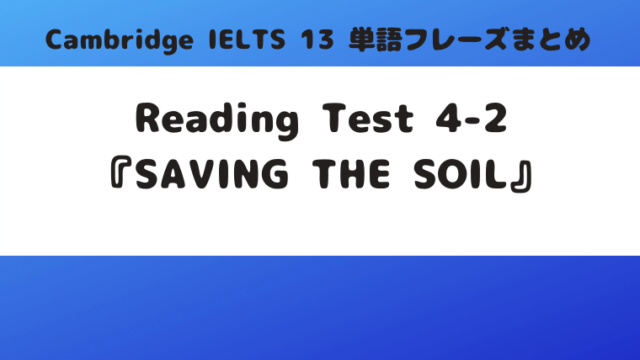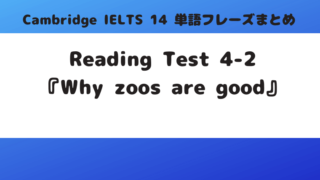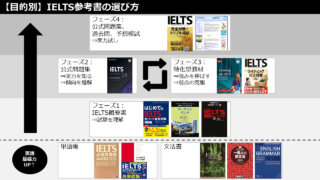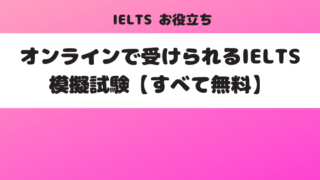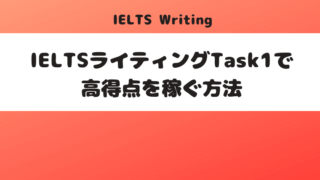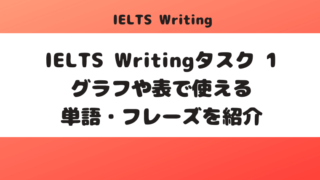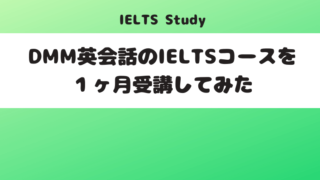「Cambridge IELTS 14」Reading Test4-3『Assessing the threat of marine debris』の単語・フレーズをまとめました。
私がIELTS Readingの単語・まとめを行う理由は「Cambridge IELTS Reading単語・フレーズまとめ」からご覧ください。
Reading Test 4 Passage 3:Assessing the threat of marine debris
- dismal
adjective /ˈdɪz.məl/
・sad and without hope:
・informal very bad
1 <部屋・天気などが> 陰鬱(いんうつ) な, 陰気な, (薄)暗い
2 <状況などが> 見通しの暗い, 絶望的な
3 <記録・業績・失敗などが> 惨憺(さんたん) たる, お粗末な, 惨めな - marine-debris
=ocean trash(漂流・漂着ごみ)
sound - verb /saʊnd/
・to seem good, interesting, strange, etc. from what is said or written:
・ to seem like something, from what is said or written:
・to seem angry, happy, rude, etc. when you speak:
・to make a noise:
・to cause a noise to be made or say or shout a message to warn people about something:
・to measure the depth of a mass of water, such as the sea, usually by sonar
1 《連結動詞》 (聞いた[読んだ]感じでは) …に思える, …のようだ
2 《連結動詞》 <音・声などが> …(のよう)に聞こえる
3 《連結動詞》 <人が> …のような声[言い方]である, <声が> …のように聞こえる
4 《他》 sound a warning
5 a) 《自》 <ベル・警報などが> 鳴る
b) 《他》 <ベル・警笛など> を鳴らす
6 《他通例受け身形で》 〘専門〙 <ある文字> を発音する
7 《他》 〘専門〙 <水深> を測る, <海底など> の水深を測る - speculate
verb /ˈspek.jə.leɪt/
・to guess possible answers to a question when you do not have enough information to be certain:
・to buy and sell in the hope that the value of what you buy will increase and that it can then be sold at a higher price in order to make a profit:
1 a) 《自》 憶測する, (当て)推量する
b) 《他》 …と憶測する
2 《自》 投機する - seabird
noun /ˈsiː.bɜːd/
a bird that lives near the sea and gets its food from it
(カモメなどの) 海鳥 - at risk of
~の危機 - faulty
adjective /ˈfɒl.ti/
A faulty machine or device is not perfectly made or does not work correctly
1 <装置・構造などが> 欠陥のある, 不完全な
2 <推論などが> 間違った, 不完全な - strikingly
adverb /ˈstraɪ.kɪŋ.li/
in a way that is very unusual or easily noticed, and therefore attracts a lot of attention
1 著しく, 目立って
2 (美しさ・魅力などについて) はっとするほど - muscle
noun /ˈmʌs.əl/
・one of many tissues in the body that can tighten and relax to produce movement:
・to injure a muscle by stretching it too far so that it is very painful:
・the power to do difficult things or to make people behave in a certain way:
1 《C, U》 筋肉
2 《U》 力, 影響力
同意 clout
3 《U》 腕力
4 《U》 〘インフォーマル〙 用心棒 - ingest
verb /ɪnˈdʒest/
to eat or drink something
<食物・薬など> を摂取する → digest - bloodstream
(体内を循環する) 血液, 血流 - shellfish
noun /ˈʃel.fɪʃ/
sea creatures that live in shells and are eaten as food, or one of these creatures
甲殻類 ((エビ,カニなど)) → seafood - bothersome
adjective /ˈbɒð.ə.səm/
annoying or causing trouble
厄介な, 面倒な, こうるさい - entangle
verb /ɪnˈtæŋ.ɡəl/
・to cause something to become caught in something such as a net or ropes:
・involved with something or someone in a way that makes it difficult to escape
1 (網などに) …を引っかける, 絡ませる
2 (面倒な状況に) <人> を巻き込む - shed
verb /ʃed/
・(often used in newspapers) to get rid of something you do not need or want:
・to lose a covering, such as leaves, hair, or skin, because it falls off naturally, or to drop something in a natural way or by accident:
・to produce tears, light, blood, etc.:
1 <不要な物など> を取り除く, <従業員など> を解雇する, <体重など> を落とす
2 <植物が> <葉> を落とす, <動物が> <毛・皮など> を脱ぎ替える
3 <物> を落とす, <服> を脱ぎ捨てる
4 〘文〙 <光・熱など> を発する, 注ぐ
5 <水> をはじく - eroded
verb /ɪˈrəʊd/
・to rub or be rubbed away gradually:
・to slowly reduce or destroy something:
1 a) 《他》 <土地など> を浸食する
b) 《自》 浸食する
2 a) 《他》 <権力・自信など> を徐々に損なう, 減じる
b) 《自》 徐々に損なう, 減じる - remnant
noun /ˈrem.nənt/
a small piece or amount of something that is left from a larger original piece or amount:
1 〘特に書き言葉〙 (わずかな) 残り物, 生存者
2 (布の) 切れ端 - cutoff
noun /ˈkʌt.ɒf/
・the act of stopping the supply of something:
・a fixed point or level at which you stop including people or things
1 《C》 締切(日), 限度, 制限 cutoff date
2 (援助・供給の) 打ち切り
3 米 わき道
4 (パイプの) 遮断装置 同意 valve - tanker
noun /ˈtæŋ.kər/
a ship or vehicle that is built to carry liquid or gas:
1 タンカー
2 燃料輸送トラック - spilling
verb /spɪl/
to (cause to) flow, move, fall, or spread over the edge or outside the limits of something:
1 Image of spill a) 《他》 <液体> をこぼす
b) 《自》 こぼれる
2 《I always + adverb/preposition》 spill (out) into / onto something
<観衆・観客などが> <場所>にあふれ出る
3 《I always + adverb/preposition》 spill into / onto something
<光・明かりが> <場所>にさし込む - conjure
verb /ˈkʌn.dʒər/
to make something appear by magic, or as if by magic
1 a) 《自》 手品をする b) 《他》 …を手品で出す
2 《他》 〘フォーマル〙 <イメージ・考えなど> を思い起こさせる, ほうふつとさせる 同意 conjure up - suck up
to try to make someone in authority approve of you by doing and saying things that will please them:
1 suck up 〘けなして〙 へつらう, ごまをする
suck up to somebody
<人>にへつらう
2
→ suck it up文句を言わずにやる - strategically
adverb /strəˈtiː.dʒɪ.kəl.i/
・in a way that helps to achieve a plan, for example in business or politics:
・in a way that provides military forces with an advantage:
戦略的に, 戦略上 - perception
noun /pəˈsep.ʃən/
・a belief or opinion, often held by many people and based on how things seem:
・the quality of being aware of things through the physical senses, especially sight:
・someone’s ability to notice and understand things that are not obvious to other people:
1 《C》 認識, 考え(方)
2 《U》 知覚, 感覚
3 《U》 (生まれつきの) 理解力, 洞察力 - entanglement
noun UK /ɪnˈtæŋ.ɡəl.mənt/
・a situation or relationship that you are involved in and that is difficult to escape from:
・military uk specialized a fence made of wire with sharp points on it, intended to make it difficult for enemy soldiers to go across an area of land
1 《C, U》 もつれた[面倒な]事態, ごたごた
2 《C》 もつれ合ったもの
同意 tangle
3 《C, U》 引っかかる[もつれる]こと - interrogating
verb /ɪnˈter.ə.ɡeɪt/
・to ask someone a lot of questions for a long time in order to get information, sometimes using threats or violence:
・computing specialized to get information from a computer
<人> を尋問する, 取り調べる
